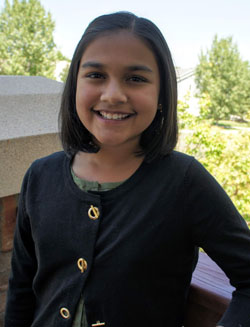Section navigation
 Gitanjali R.
Gitanjali R.
Meet Gitanjali. She's a student on a mission to use science and technology to help people live safer and healthier lives. At a young age, she became interested in STEM (science, technology, engineering, and math), and ever since, she's been experimenting and sharing her ideas in science competitions. Read her interview to learn how she's using science to solve problems and her advice for girls who want to do the same.
![]()
How old are you?
I am 13 years old.
![]()
What sparked your interest in STEM?
My parents introduced me to STEM at a young age. At my house, we did a lot of hands-on learning activities, and I experimented with science kits. This helped me learn about magnets, light, and electrical circuits. I also collected rocks and studied the differences in how they were formed. This sparked my interest in hands-on learning, and I slowly started creating small inventions for competitions. I love solving problems, so the more I learn, the more curious I become. I continue to take on more challenging projects.
![]()
You won the award of "America's Top Young Scientist!" Tell us about your invention and what inspired you to enter the competition.
My invention started with an idea to use nanotechnology to detect lead in drinking water. Nanotechnology is the study and creation of objects that are so tiny we can't even see them with a microscope. My 4-H Club STEM leader introduced me to the Discover Education 3M Young Scientist Challenge and encouraged me to compete. When it came time to create an idea for the competition, I was inspired by the water issues that were happening in Flint, Michigan. I had known that their water was unsafe for people to drink, so I decided to try to create a tool that would help people know if their water is safe to drink.
![]()
That's incredible, and it's not the only award you've won! What have you learned from entering these competitions?
I usually enter these challenges to get feedback on my work and talk to professional mentors working in STEM. These competitions are great opportunities to find mentors who can share advice and help make my ideas a reality.
![]()
What are your future plans for this project?
I still have to finish testing my water quality device to make sure it works correctly and is easy to use. My hope is to create at least 50 models for people to use to test the quality of their drinking water.
![]()
Success doesn't happen overnight, especially when it comes to STEM projects or experiments. How do you stay motivated when things don't go as planned?
Most of the challenges I face are about how to run an experiment or where to do it safely. I am always determined to find a solution, so when I run into these issues, I usually take a break and then come back to the problem with new ideas. My parents and mentors encourage me to reach out to professors or scientists for support. I used to be afraid to ask experts for help, but I have learned that the worst answer you can get is a "no." So why not ask? I have been lucky to get tips from professors. Also, organizations and universities have let me use lab space for research, which makes it easier to do experiments safely. The biggest thing that keeps me motivated when I'm up against a challenge is knowing that my work could help other people.
![]()
Have people ever doubted you because of your age? If so, how do you stay confident in yourself?
Neither my parents nor my teachers or mentors have ever doubted me because of my age. If I get stuck on something, they always show me another approach or way to keep moving. The more I do, the more mistakes I make, the more I learn. That helps me believe in myself and feel confident that I can take on new challenges.
![]()
What is your dream job, and why?
I have changed my plan every year since second grade! But for the last 2 years, I've been interested in becoming an epidemiologist. Epidemiologists are like detectives. They are scientists who study diseases within groups of people. They try to figure out what causes a disease outbreak (which is when a lot of people get sick with the same disease at the same time), how to treat the disease, and how to prevent future outbreaks from happening.
![]()
Aside from STEM, do you have any hobbies or favorite activities?
I love to bake, swim, and fence. I also enjoy playing the piano.
![]()
Do you have any advice for girls who want to learn more about STEM?
My only advice is to try it! Don't let anyone tell you that science, coding, engineering, and building aren't for girls. We are more than capable. If you're not sure where to start, find a mentor who can guide and support you.
![]()
What would you like girls to know about working toward their goals?
Just because your friends and other people your age might like to do something, it doesn't mean it's for you. Do what you like to do! You can do whatever you set your mind to.
![]()
Hear from another girl passionate about STEM and read about STEM jobs and exploring your career path.
Content last reviewed Monday, January 28, 2019
Page last updated Thursday, January 31, 2019







